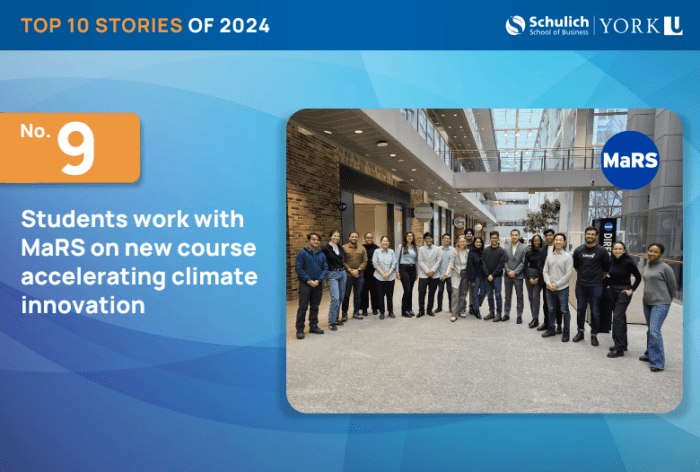Top 10 Schulich Stories of 2024
During 2024, Schulich launched the OMERS & Oxford Real Assets Leadership Institute, supported by a term-funded Chair in Real Assets. The Institute aims to attract and develop top-tier students into future leaders while advancing actionable research valued by the real estate and infrastructure industry. Joseph Ogilvie, a long-time faculty member in Schulich’s Master of Real Estate and Infrastructure program, will serve as the inaugural Chair, driving collaboration between academia and industry, enhancing curriculum, and fostering innovative research. This initiative cements Schulich’s reputation as a global leader in real estate and infrastructure education.
Schulich developed a dynamic new “super course” on Artificial Intelligence in September 2024. Called Empowering Business Growth: Exploring Artificial Intelligence and Machine Learning, the course is open to all Schulich students and offers an engaging and immersive journey into the world of Artificial Intelligence and Machine Learning, with a focus on harnessing these tools to drive innovation and create strategic advantages. The course, taught by some of the leading AI instructors at Schulich, gives students the opportunity to develop leadership skills that will prepare them for a business world that is being transformed by AI.
Schulich Giving Day 2024 raised a record-high amount – more than $375,000 from 467 donors, surpassing $1 million in total funds raised since the fundraiser started five years ago. This year’s campaign focused on the Schulich Highest Priorities Fund and student support, driving transformational impact through financial assistance, exceptional business education, and career preparation. Dean Detlev Zwick expressed gratitude for the Schulich community’s generosity, calling it a testament to the School’s enduring spirit of collaboration and shared success. Highlights included 85 first-time alumni donors, participation from alumni across 10 countries, and over 40% of funds directed to top priorities.
Schulich partnered with Corporate Knights to develop one of Canada’s first-ever climate finance indexes in 2024. This groundbreaking tool will measure corporate investments in decarbonization across key sectors such as transportation, buildings, and power, providing critical insights into Canada’s progress toward a clean economy. In June, Schulich and Corporate Knights convened two dozen industry leaders to collaboratively shape the index. Schulich’s Olaf Weber, CIBC Chair in Sustainable Finance, emphasized the index’s role in objectively tracking corporate climate efforts, moving beyond generic sustainability claims. The new Climate Finance Index will help businesses benchmark their progress, inform public policy, and highlight Canada’s Climate Investment Gap.
Seven Schulich faculty members were recognized among the top researchers in Canada and globally in the 2024 Research.com “Ranking of Best Scientists” in Business and Management. Four Schulich researchers ranked among Canada’s top 50, highlighting the School’s research excellence. Honorees include Preet Aulakh, Russell W. Belk, Eileen Fischer, Anoop Madhok, Dirk Matten, Dean Neu, and Justin Tan, each renowned for their contributions to fields such as international business, marketing, and corporate social responsibility. During the year, Schulich also attained a record high dollar amount of research grant funding – $1.67 million – and a record high number of grant applications submitted.
Schulich launched a new Graduate Diploma in Accounting Analytics (GDAN), an online, part-time program that began in September 2024. Tailored for accounting professionals with 2-4 years of experience, the eight-month program equips participants with advanced skills in data analytics, visualization, and generative AI technologies, fostering leadership and critical thinking. A standout feature is a hands-on consulting project, enabling students to deliver actionable, data-driven business insights. Designed for working professionals, this innovative diploma blends accounting expertise with cutting-edge technology to prepare graduates for careers in the evolving field of accounting analytics.
Schulich signed an agreement with ESSEC Business School in France to establish a dual degree program, marking Schulich’s first bidirectional exchange-based dual degree at the undergraduate level. The program enables students in Schulich’s BBA program to spend two years at Schulich and two years at ESSEC, earning degrees from both institutions. This initiative is the latest advance in Schulich’s global education strategy, aimed at fostering richer learning experiences and creating international linkages. In addition to this new undergraduate program, Schulich offers several MBA dual degree programs with partner schools worldwide, including institutions in China, Mexico, Peru, Chile, Thailand, and Germany.
Schulich was rated one of the world’s top 100 MBA programs for career outcomes in a new global ranking conducted by LinkedIn, the world’s largest business and employment-focused social media platform. Schulich placed 87th, while Stanford finished 1st overall, followed by INSEAD and Harvard. The LinkedIn ranking rates MBA programs that best set their alumni up for career success and is described as “the 100 best business schools around the world to help you get ahead in your career”.
The Sustainability area at Schulich launched Scaling Climate Innovations (SUST 6152), an experiential learning course bringing together MBA, Master of Management, and MBA/JD students for cross-program collaboration. Taught by Klaudia Watts, the course focuses on scaling sustainability innovations to drive meaningful impact. Through an academic partnership with MaRS, students work directly with stakeholders in sectors like clean tech and government to advance climate solutions. The course provides students with an invaluable opportunity to merge theory with practice, build networks, and gain hands-on experience in overcoming barriers to scaling transformative climate technologies.
During the past year, Schulich undertook a number of initiatives to Indigenize the campus, including: creating an Indigenous story-telling mural in the school’s undergraduate student lounge; creating an Indigenous garden by planting the Three Sisters Crops (corn, beans, squash) – a staple of Indigenous agriculture – in the McEwen Courtyard; and commencing the process of adding plaques to our buildings to honour and explain the “Indigenous Nations Land Acknowledgement” and the meaning of the Medicine Wheel – an important Indigenous symbol – which will be reflected in the McEwen atrium.








